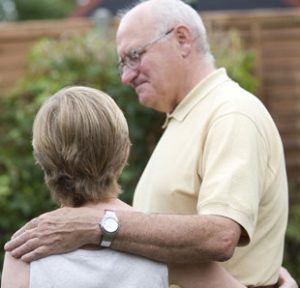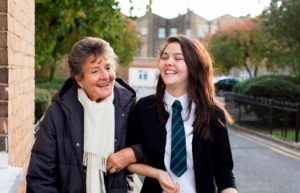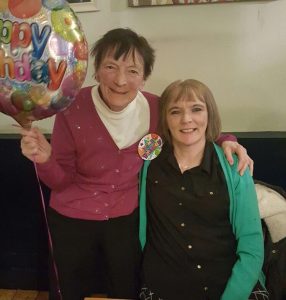Latest News
Unpaid carers save economy almost £60bn each year
About 8% of the UK population living in private households acted as informal carers last year, Department of Work and Pensions figures show.
The ONS calculates that it would cost £56.9bn to replace these unpaid carers with paid workers.
Both sexes spent more time on unpaid care in 2015 than in 2000, it says.
The ONS links the rise in unpaid care by family members to “a rapidly ageing population and a higher life expectancy”.
“At age 65 a man will spend, on average, 44% of the rest of his life in poorer health, and a woman, 47% of her life,” says the ONS document.
Women are more likely than men to be informal carers, with women making up 59% of carers.
‘Active caring’
The Department for Work and Pensions definition of care is quite broad, including doing someone else’s shopping or helping them with paperwork.
The ONS also looked at figures for “active caring”, which is the amount of time washing someone or replacing bandages.
On average, women over 50 spent one minute and 15 seconds “actively caring” for someone each day, the ONS found.
The figure for men of the same age was just 45 seconds.
But the amount of caring time spent by both sexes had risen between 2000 and 2015, by 15 percentage points for men and 21% for women.
The ONS analysis of the 2011 Census indicates that when women reach 50 they are likely to spend 5.9 years of their remaining life as unpaid carers.
“In contrast, men at 50 are likely to spend 4.9 years of their remaining life as an unpaid carer,” it says.
By 65, these figures reverse, with 65-year old women likely to spend 2.6 of their remaining years as unpaid carers, and 65-year-old men 2.7 years, the ONS says.
The analysis found that half of adult carers were employed either part- or full-time.
And almost a third of these (29%) said they spent 35 hours or more a week as informal carers.
The value of unpaid care outweighs the amounts spent on formal social care, the document suggests.
The latest figures show that NHS England spent almost £17bn on social care in 2015-16, while Wales spent £1.4bn.
Scotland spent £2.9bn in 2013-14, according to the latest figures available.
Northern Ireland calculates the figures in a different way, so they are not directly comparable, says the ONS.
Heléna Herklots, chief executive of Carers UK said the organisation’s own research reflected the ONS analysis.
“More and more of us are providing care for an older, disabled or ill loved one, yet even a few hours caring a week can result in having to cut down hours or give up work, bringing devastating and irreversible consequences for long term financial security.
“As our population ages, growing numbers of people will be juggling work and care, particularly in later life and society and public services must adapt to support them,” said Ms Herklots.

Young adult carers (16 to 25) research survey
We need your help to ensure that the research is robust and meaningful. LSE are asking young people with caring responsibilities and their families to complete a short (15-20 minute) questionnaire about their experiences.
If you work with any young adult carers aged 16 to 25, please encourage them to complete the questionnaire online.
Or, you can email Nicola Brimblecombe to be sent a paper copy.
If enough young people complete the questionnaire, it means that the true support needs of young carers and their families can be recognised and used to campaign for change - so please do urge all of the young adult carers and families you work with to respond.
To find out more about the research, please visit the LSE’s website.

Chief medical officer calls for gene testing revolution
Prof Dame Sally Davies says in her annual report that the NHS must deliver her “genomic dream” within five years.
Over 31,000 NHS patients, including some with cancer, have already had their entire genetic code sequenced.
Dame Sally wants whole genome sequencing (WGS) to become as standard as blood tests and biopsies.
Personalised medicine
Humans have about 20,000 genes – bits of DNA code or instructions that control how our bodies works.
Tiny errors in this code can lead to cancer and other illnesses.
Sometimes these mistakes are inherited from a parent, but most of the time they happen in previously healthy cells.
WGS – which costs about £700 – can reveal these errors by comparing tumour and normal DNA samples from the patient.
Dame Sally says that in about two-thirds of cases, this information can then improve their diagnosis and care.
Doctors can tailor treatments to the individual, picking the drugs mostly likely to be effective.
And WGS can also show which patients are unlikely to benefit, so they can avoid having unnecessary drugs and unpleasant side-effects.
Quicker diagnosis
Dame Sally wants DNA testing to become standard across cancer care, as well as some other areas of medicine, including rare diseases and infections.
“I want the NHS across the whole breadth to be offering genomic medicine – that means diagnosis of our genes – to patients where they can possibly benefit,” her report says.
People with rare diseases could benefit from having greater access to the technology, speeding up diagnosis.
Doctors are already using genetic tests to identify and better treat different strains of the infectious disease tuberculosis.
Dame Sally said patients could be assured that their genetic data would be stored securely and “de-identified” so that their privacy would be protected.
Currently, genetic testing of NHS patients in England is done at 25 regional laboratories, as well as some other small centres.
Dame Sally wants to centralise the service and set up a national network to ensure equal access to the testing across the country.
A new National Genomics Board would be set up, chaired by a minister, to oversee the expansion and development of genomic services.
Sensitive data
Dame Sally told BBC Breakfast that a lot of money was being spent because it was currently operating like a “cottage industry”.
By having centralised laboratories, more could be done with the money, including keeping up with the latest technology, she said.
She said one hurdle could be doctors themselves, who “don’t like change”, and she urged cancer service patients to press their doctors to move from a local to a national service.
She also said patients must understand they needed to allow use of their data, alongside other data, in order to get the best diagnosis, and therefore the best treatment.
Phil Booth, from campaigning organisation, MedConfidential, said this move had “huge potential” for patients and the NHS, but there were “great risks with large collections of sensitive data”.
“Every single use of patient data must be consensual, safe and transparent,” he told BBC Radio Four’s Today programme, and patients should be able to opt-out if they so wish.

Have your say on how we teach doctors of the future!
What are they doing?
Kings College London is currently changing to a new way of teaching medical students. As part of this the Long Term Conditions module aims to give them the skills and confidence they need to support people to live well with long-term conditions.
How you can help?
Kings College London are very keen that they involve patients and carers in the discussion around how they do this. They have arranged a meeting on July 6 to have round-table discussions about how they ensure that young doctors leave the module with the skills they need to support people with long-term conditions
As a member of the group you’ll really have a chance to influence how Kings College London teach doctors of the future.
This is a very new idea and the team are still learning. Taking part at this stage gives you a chance to have a real impact for the better, shaping medical students’ learning.
Kings College London are looking for:
- individuals who have had direct experience of seeing doctors for help with a long-term condition (such as diabetes, arthritis, COPD – any condition that is being ‘managed’ rather than ‘cured’)
- carers or relatives of someone with such a condition
Do you have experience?
If you have experience or if you would like more information, please get in touch with David Codling
on 07774734011 or [email protected].

I’m a Full-Time Carer, But it Took Me Years to Realise I Needed Help as Well
When I was nine, I started caring for my mum with special needs. But it wasn’t until I was about 13 that I realised it was causing me severe anxiety. When I first started caring for mum, I was decorating the house, cooking and did the cleaning. One day when I was 11 or 12, my mum asked me to dye her hair for her when there was a knock at the door. It was the police. They said, “We need your mum to come to the station. She hasn’t paid her TV licence.†It wasn’t her fault, but she couldn’t deal with her finances. I used to worry about things like that. It was like I was the adult because mum didn’t know how to look after us. She tried her best, but I brought myself up.
I’ve got two older brothers. My oldest brother was always out with his friends – I think that was his way of dealing with his childhood. My middle brother has special needs as well, and went to boarding school because he was quite disruptive and my mum couldn’t cope with him. He used to come home at holidays and weekends, but I’d feel anxious because he’d take my stuff so I couldn’t really have anything of my own.
I didn’t have a dad growing up, so I missed that nurturing and emotional connection where you can just talk to your parents. I think all the stress and worry of dealing with my mum’s finances and her wellbeing, as well as trying to look after myself emotionally, just became too much and I exploded. I don’t blame my mum, but I just wanted what most children do: your mum, your dad and your family. I didn’t have that emotional need filled as a child.
I didn’t realise the impact it had on me until I got older and started noticing feeling anxious when I went out. I felt worried about everything and had to be one step ahead. It was like being in the fast lane and your mind’s constantly on the go so you never get a moment’s rest.
I kept it to myself as a teenager and didn’t talk to anyone about how I was feeling, because I didn’t really understand what was happening to me. My mum’s a bit like a child so I couldn’t talk to her about it. We don’t have a normal mother-daughter relationship where you can talk to each other about most things. I felt quite alone really. It was only when I got older that I started looking for help.
When I was in my early 20s, I went back and forth to the doctor saying I was anxious about every little thing, over-worrying when I went out and felt like it was getting out of control. I was diagnosed with generalised anxiety disorder and they gave me lots of different antidepressants. Some people are fine on them, but I had some really bad side effects. I thought, “I’ve got to do something else.â€
I went to talking therapies on and off for a few years, and I think it’s really good that the NHS provides the service, but it isn’t for everyone. You can only see a counsellor for so long, so you’d just get used to them and start feeling comfortable when they’d say, “You’ve got to refer yourself again if you want to come back for more treatment.†The hardest thing with being a carer is reaching out to other people and asking for help, because you’re so used to helping others. It’s hard to change and say to people, “Can you help me?†In the end, I thought, “I’m going to have to do something myself.†So that’s when I looked for a private counsellor.
Some counsellors do a free consultation, which is really good to get an idea of whether they’re the right person for you. I tried a few but they weren’t quite right, and I gave up for a while because I thought I’d never find someone. Eventually I gave it one last go. I still wasn’t 100% sure for the first couple of sessions, but I persevered. Now I’ve stuck to it, I’ve realised it’s the best decision I’ve ever made.
I’m on a low income so I was worried about going private, but I know it’s important. It’s my own me-time to talk about how I’m feeling. It’s really helping me so far, and I’m glad that after all this time I’ve found someone who understands.
I’m still caring for my mum and I’ve taken over her finances, paying all her bills. I do her shopping, and cook for her most days. She’s 83 now, so she’s got a few health problems as well. I love her to bits, but sometimes it sounds like I’m moaning because I can get really stressed with her. That’s when I know I need to take a little space, but it’s hard to break the habit when you’ve trained your mind to visit her so often.
She gets in funny moods a lot, and consciously I know she doesn’t understand how her behaviour’s affecting me, but subconsciously my mind’s taken that in over the years. She’s a very anxious person herself so she needs lots of reassuring, and because I’m saying the same thing over and over again it does bring me down. As soon as I get to the door, I can feel my stress level going up. It can be draining to be a carer, but it’s important to make sure you look after yourself because if you’re not well enough to be able to look after them, then who will?
I know some people can’t leave the person they’re caring for so I do feel fortunate that I’m able to. That doesn’t mean to say I’m not constantly worrying about her. Mum’s recently been diagnosed as partially blind – age-related macular dryness – and it can’t be treated so her eyesight’s going to get worse.
On a positive note, I’m a lot better than I was. I used to get worked up weeks ahead of an event, physically shaking and sat there wondering what’s wrong with me. But now I’m aware of my triggers and understand why I feel that way. I think your mind can only take so much stress and trauma before it thinks, “fight-or -flightâ€. But I’ve found the more that I go out and try things, the more my anxiety goes down. No matter how hard it is, you’ve got to face it, and the more you do it, the easier it becomes.
I’m proud of myself because I’ve done a lot of things in the last couple of years that I never would have a few years ago. I went on an aeroplane for the first time with my son Carl, my daughter Emma, and their partners. The doctor gave me some diazepam just in case, but I felt so proud because I didn’t need it. My family were so supportive and really helped me. I’ve missed out on so much because of my anxieties; now I’m getting older I don’t want to let them hold me back anymore. I saw this as a challenge and thought, “I’m going to do it.â€
Throughout everything, my family have been my rock. I’ve brought my two children up on my own. I’m 53 now, but I’ve had so much happen in my life, not just with my mum, but my mental health and other problems. The good thing that’s come out of it is that I think I’m a better, more understanding person for it.
I want people to realise there are people who care, and people out there who can help you. Don’t feel like you’ve got to struggle alone. If I hadn’t pushed myself, I wouldn’t be where I am today. I’ve got a long way to go, but I know that I’m improving and getting there. There is hope.

Digital health wearables for monitoring health and activity of the person being cared for survey
Our current focus is on fitness trackers, commonly referred to as activity trackers, wearable fitness devices which track daily fitness levels. Examples include wrist-bands from Fitbit or Jawbone, or smart watches from Apple or Samsung, or smart rings or bracelets. Typically these devices record steps walked, heart rate, sleep patterns, or calories expended.
If you have any queries about the survey or if you would like to reach us on email, please contact Professor Shailey Minocha of The Open University, UK: [email protected]

Sing Before You Speak Again Community Show Auditions
We are looking for people to be part of a community choir that will perform the show at the Young Vic, and at the centres we have collaborated with on the workshops. It will be a fun, informal workshop audition, and no prior singing experience is necessary.
Rehearsals: Tuesday evenings and Saturday daytimes from Tuesday 29 August
Technical rehearsals: Monday 30 October – Wednesday 1 November
Performances at the Young Vic: Thursday 2 – Saturday 4 November
If you are interested in auditioning, please email [email protected] with your name, date of birth, a contact telephone number by midday on Friday 7 July. Please let us know if you have any prior singing experience (but don’t worry if you don’t!).
Saturday 29 July, slots between 10am and 4pm

Disabilities Hub Consultation
Southwark Council
PO Box 64529
London, SE1P 5LX
www.southwark.gov.uk

A practical guide to healthy caring
A carer is anybody who looks after someone who needs help because of their illness, frailty or disability. There are 5.4 million carers in England who make a critical and often underappreciated contribution not only to loved ones, neighbours and friends, but to the very sustainability of the NHS itself.
Caring for someone who is ill or disabled can help people live well at home and be part of their local community, but you also have to make sure you look after your own health and wellbeing too. The advice given here will provide hints and tips onhow you can look after your own health as well as support the person you care for.

